|
|
|
Sort Order |
|
|
|
Items / Page
|
|
|
|
|
|
|
| Srl | Item |
| 1 |
ID:
188930
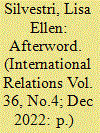

|
|
|
|
|
| Summary/Abstract |
How should we think about war today? This afterword assesses the impact of using a temporal lens to understand contemporary conflict. Reflecting upon my own work on media and war alongside wider societal relationships to violence, I consider the ways in which new technologies and styles of warfighting change both our view of time and our understanding of war itself. In particular, I show how a shift from space to time helps focus attention on the personal and lived experience of US war, on the importance of routines both in constituting and obscuring wartime, on how many issues of contemporary war have become a matter of digitized perspective, and finally how emergent technologies have unsettled familiar temporal patterns of conflict. War today is media-drenched but struggles to occupy our attention over sustained periods. It remains an epochal political force that we tend to approach through deeply individualized, microcosmic stories. It proceeds at breakneck pace but rarely gets anywhere. These questions and tensions underline the importance of focusing not only on the resolutely temporal aspects of wartime, but also on the way in which shifts in time are changing the very nature and politics of war in the 21st century.
|
|
|
|
|
|
|
|
|
|
|
|
|
|
|
|
| 2 |
ID:
142871
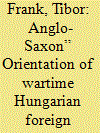

|
|
|
|
|
| Summary/Abstract |
The political élite of Hungary included a group that expected British and American support for Hungarian revisionist claims after the Paris Peace Conference. Their acknowledged leader was Count István Bethlen, the prime minister from 1921 to 1931 and an adviser to Regent Vice-Admiral Miklós Horthy until 1944. This analysis investigates a largely forgotten member of this group. Antal Ullein-Reviczky, a diplomat and scholar, shifted from being a Hungarian nationalist with an anti-Nazi attitude towards secret efforts to establish political relations with Britain during the Second World War. Press chief of the Foreign Ministry and the prime minister’s office, Ullein-Reviczky’s last appointment was Hungarian minister at Stockholm in 1943–1944. Both the Germans and the British put little trust in a man whose wife was the daughter of a British diplomat, yet who maintained superb connexions in pro-German Hungary. He changed his mind gradually when he realised that the price for revising the Treaty of Trianon was unacceptable. His long journey through international politics made him a significant player in a global drama, also assisting Raoul Wallenberg’s mission to Budapest. It is a political odyssey worth remembering.
|
|
|
|
|
|
|
|
|
|
|
|
|
|
|
|
| 3 |
ID:
093248
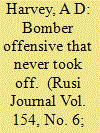

|
|
|
|
|
| Publication |
2009.
|
| Summary/Abstract |
The Italian Regia Aeronautica was, in 1940, one of most powerful air forces in the world. Yet even when compared to the mixed records of other wartime air forces, it failed to significantly further Italy's war aims. In technology, training, tactics and strategy, the Regia Aeronautica failed to match the progress of the Luftwaffe or RAF, through misjudged dispositions and diffuse objectives. This article charts the squandering of a potentially important Axis asset.
|
|
|
|
|
|
|
|
|
|
|
|
|
|
|
|
| 4 |
ID:
171339
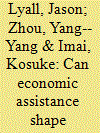

|
|
|
|
|
| Summary/Abstract |
Governments, militaries, and aid organizations all rely on economic interventions to shape civilian attitudes toward combatants during wartime. We have, however, little individual-level evidence that these “hearts and minds” programs actually influence combatant support. We address this problem by conducting a factorial randomized control trial of two common interventions—vocational training and cash transfers—on combatant support among 2,597 at-risk youth in Kandahar, Afghanistan. We find that training only improved economic livelihoods modestly and had little effect on combatant support. Cash failed to lift incomes, producing a boom-and-bust dynamic in which pro-government sentiment initially spiked and then quickly reversed itself, leaving a residue of increased Taliban support. Conditional on training, cash failed to improve beneficiaries’ livelihoods but did increase support for the Afghan government for at least eight months after the intervention. These findings suggest that aid affects attitudes by providing information about government resolve and competence rather than by improving economic livelihoods.
|
|
|
|
|
|
|
|
|
|
|
|
|
|
|
|
| 5 |
ID:
170593
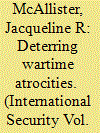

|
|
|
|
|
| Summary/Abstract |
Advocates of wartime international criminal tribunals (ICTs) hope that such tribunals can deter combatant atrocities against civilians. Yet, more than twenty-five years after the establishment of the first wartime ICT—the International Criminal Tribunal for the former Yugoslavia (ICTY)—wartime ICTs’ role in deterring such violence remains a matter of debate. Insights from criminology, as well as research on civil conflicts and international legal compliance, suggest that ICTs are most likely to deter government and rebel forces from committing atrocities against civilians when all three of the following conditions are present: (1) ICT officials have secured sufficient prosecutorial support, (2) combatant groups rely on support from liberal constituencies, and (3) combatant groups have centralized structures. Case studies of the ICTY's impact on fourteen combatant groups from the Yugoslav conflicts—combined with hundreds of field interviews with war veterans and others—confirm this prediction. The ICTY's record thus sheds important light on how and when contemporary wartime ICTs—including the International Criminal Court—might succeed in deterring combatant atrocities against civilians.
|
|
|
|
|
|
|
|
|
|
|
|
|
|
|
|
| 6 |
ID:
152919
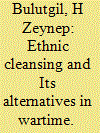

|
|
|
|
|
| Summary/Abstract |
According to the extant literature, state leaders pursue mass ethnic violence against minority groups in wartime if they believe that those groups are collaborating with an enemy. Treating the wartime leadership of a combatant state as a coherent unit, however, is misleading. Even in war, leaders differ in the degree to which they prioritize goals such as maintaining or expanding the territory of the state, and on whether they believe that minority collaboration with the enemy influences their ability to achieve those goals. Also, how leaders react to wartime threats from minority groups depends largely on the role that political organizations based on non-ethnic cleavages play in society. Depending on those cleavages, wartime minority collaboration may result in limited deportations and killings, ethnic cleansing, or minimal violence. A comparison of the policies of three multinational empires toward ethnic minority collaborators during World War I—the Austro-Hungarian Empire and Italians, the Ottoman Empire and Armenians, and the Russian Empire and Muslims in the South Caucasus—illustrates this finding.
|
|
|
|
|
|
|
|
|
|
|
|
|
|
|
|
| 7 |
ID:
036666
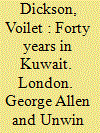

|
|
|
|
|
| Publication |
London, George Allen and unwin Ltd, 1971.
|
| Description |
335p.hbk
|
| Standard Number |
0049200321
|
|
|
|
|
|
|
|
|
|
|
|
Copies: C:1/I:0,R:0,Q:0
Circulation
| Accession# | Call# | Current Location | Status | Policy | Location |
| 010314 | 953.67/DIC 010314 | Main | On Shelf | General | |
|
|
|
|
| 8 |
ID:
104797
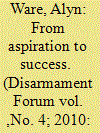

|
|
|
| 9 |
ID:
188927
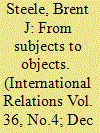

|
|
|
|
|
| Summary/Abstract |
Following the 2004 establishment of the World War II memorial in Washington DC, itself a product of the collective re-commemoration of the so-called ‘Greatest Generation’ of WWII veterans in the US, nonprofit organizations began the practice of ‘Honor flights’. These flights transported US veterans of the Second World War to Washington DC to visit that memorial and other commemorative sites, meet with Congressional members, and return to their local airports to great fanfare and celebration. The practice has evolved to incorporate Korean War and now Vietnam War veterans. As honor flights include much more than the veterans themselves, and as it has become an affectively charged festival for local communities to ‘honor’ their veterans during periods of unresolved wartimes, I articulate the Honor Flight as a treatment for – but also a symptom of – US ontological insecurity in the 21st Century. Honor flights are celebratory, judgmental, and political micro-practices that reflect and reproduce US militarism in ways that will likely outlast the wartimes of the 21st century United States. Along with other micro-practices of US ontological (in)security, Honor Flights threaten to destabilize the politics of military intervention hereafter, and encourage the extension of or inauguration of new times of war.
|
|
|
|
|
|
|
|
|
|
|
|
|
|
|
|
| 10 |
ID:
124789
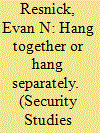

|
|
|
|
|
| Publication |
2013.
|
| Summary/Abstract |
Neorealist and liberal theories advance discrepant explanations for variations in wartime alliance cohesion. Neorealism claims that variations in cohesion are attributable to shifting international systemic conditions; liberalism argues that such differences are a function of the regime type(s) of the various alliance partners. I advance a synthetic neoclassical realist theory that proposes a given ally's decision to minimize or maximize cohesion is a function of both international systemic conditions and the regime type of the state in question. I test the three theories in US, British, and Soviet alliance decision making during World War II and find that neoclassical realism alone accounts for the behavior of all three partners over the lifespan of the "Grand Alliance" (January 1942-September 1945). The article concludes by discussing the implications of these findings for the study and practice of alliance politics, as well as for contemporary US foreign policy
|
|
|
|
|
|
|
|
|
|
|
|
|
|
|
|
| 11 |
ID:
080335
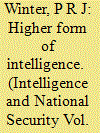

|
|
|
|
|
| Publication |
2007.
|
| Summary/Abstract |
Throughout his distinguished career, the historian Hugh Trevor-Roper was known in many incarnations and guises: the 'sleuth of Oxford'; Regius Professor of Modern History at Oxford; the Spectator's Mercurius Oxoniensis; Baron Dacre of Glanton; and Master of Peterhouse College. In addition, he was to gain wider notoriety in the early 1980s as the man who helped authenticate the forged Hitler Diaries. Nevertheless, his wartime embodiment as a British intelligence officer is one facet of his personal history that has never before been addressed by scholars in any great depth. Using previously unpublished material from Trevor-Roper's memoirs and personal papers, as well as excerpts from the Guy Liddell Diaries, this article aims to highlight the fact that, contrary to the impression engendered by F.H. Hinsley's dry and depersonalized multi-volume official history, British Intelligence in the Second World War, Major H.R. Trevor-Roper, and many other intelligence officers like him, not only had a 'good war', but a rich and colourful one. If historians are to escape the late Sir Maurice Oldfield's indictment of that official history, namely, that it was written 'by a committee, about committees, for a committee', they might do worse than begin to reappraise the role of the individual in the context of Britain's intelligence effort during 1939-45. The late Lord Dacre, so this article argues, is one such individual requiring further study.
|
|
|
|
|
|
|
|
|
|
|
|
|
|
|
|
| 12 |
ID:
102028
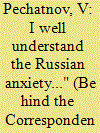

|
|
|
|
|
| Publication |
2010.
|
| Summary/Abstract |
THE WARTIME CORRESPONDENCE between Churchill and Stalin is a well-known and well-studied source on the history of Allied diplomacy. Little is known, however, how these famous messages were written. In my recent article in Russia in Global AffairsI looked at the Soviet angle 1 ; yet even the best Soviet/Russian and foreign specialists on the Soviet-British relations and Churchill have so far passed over in silence much of what was going on behind the scenes in Britain. The specifics of British diplomacy and the Cabinet system of governance, meanwhile, make the British side of the Stalin-Roosevelt-Churchill epistolary triangle especially important.
|
|
|
|
|
|
|
|
|
|
|
|
|
|
|
|
| 13 |
ID:
150576
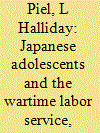

|
|
|
|
|
| Summary/Abstract |
During the Pacific War, Japanese boys and girls were increasingly pulled out of secondary school to help the war effort as factory and farm workers. Their labor-service hours kept increasing until, by January 1944, many students were working year-long shifts. This paper argues that secondary students had a sense of entitlement to education that went against the grain of their patriotic duty to the state as shōkokumin, or ‘little countrymen’. Their later memoirs support the postwar view of their labor as child abuse. However, their identity as adolescents came more from their status as students than from their age; before 1945 most Japanese left school and entered the workforce at age 14. This paper brings together evidence that has not been linked previously: (a) the voices of student workers in diaries and memoirs; (b) the disaggregation of wartime labor by age; and (c) the differential treatment of students in the workplace.
|
|
|
|
|
|
|
|
|
|
|
|
|
|
|
|
| 14 |
ID:
188926
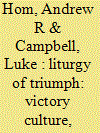

|
|
|
|
|
| Summary/Abstract |
Wartime is fundamentally important to the study of international politics but not especially well understood. In this paper, we use timing theory and the concept of liturgy to unpack the contemporary dynamics of US wartime. A theory of political timing posits that all temporalities derive from and symbolize underlying social processes, and that these timing efforts unfold according to a master organizing standard. Liturgy highlights the way that ritualized acts help participants commune with the sacred – whether this be God or the nation-state. Scrutinizing contemporary US culture practices, we combine these ideas to argue that the notion of victory, as enacted through a widespread set of performative routines, acts as an organizing standard that embeds and reifies wartime in US security policy and daily life. Prevalent ideals of winning wars gather together a stylized past, explicate present problems, and generate expectations about future problems and conflicts. We tabulate several highly influential examples of this liturgy of triumph from national calendars, commemorative sites and events, and cultural practices like spectator sports. In addition to normalizing a view of wartime as having clear beginnings and uniquely successful endings, the US liturgy of triumph highlights a growing gap in the country’s relationship to the use of force. Most of what performative war liturgies commemorate is ‘finished’; it has been seen, known, and ostensibly won. Yet, much of what defines 21st century conflict is anything but certain or victorious. Moreover, US victory culture has only grown more acute the longer the concrete victories fail to materialize, suggesting a tragic code at the heart of US security politics.
|
|
|
|
|
|
|
|
|
|
|
|
|
|
|
|
| 15 |
ID:
112055
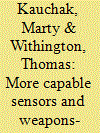

|
|
|
| 16 |
ID:
086647
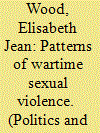

|
|
|
|
|
| Publication |
2009.
|
| Summary/Abstract |
Sexual violence incuding rape, sexual torture, sexual slavery, and forced abortion is a common form of violence against some of the most vulnerable civilians during war. As a result of the mobilization by women's groups advocating prosecution of rape in Bosnia and Rwanda, international legal authorities now prosecute various forms of sexual violence as war crimes, as crimes against humanity, and, in some contexts, as genocide.
|
|
|
|
|
|
|
|
|
|
|
|
|
|
|
|
| 17 |
ID:
103314
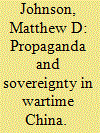

|
|
|
|
|
| Publication |
2011.
|
| Summary/Abstract |
During the later years of the War of Resistance to Japan (1937-1945), United States (US) propaganda activities intensified in both Japanese military-occupied and 'free' regions of China. One of the most important organizations behind these activities was the Office of War Information (OWI). This paper examines the OWI, and particularly its Overseas Office, as key institutional actors within a broader US total war effort which touched the lives of civilian populations in East Asia as well as combatants, arguing that:
|
|
|
|
|
|
|
|
|
|
|
|
|
|
|
|
| 18 |
ID:
174630
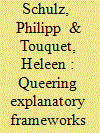

|
|
|
|
|
| Summary/Abstract |
In this article we argue that prevalent explanatory frameworks of sexual violence against men primarily pursue one line of inquiry, explaining its occurrence as exclusively strategic and systematic, based on heteronormative and homophobic assumptions about violence, gender and sexualities. Feminist IR scholarship has significantly complexified our understanding of conflict-related sexual violence (CRSV), documenting its multiple forms and causes across time and space—thereby moving beyond the persistent opportunism-strategy dichotomy and critically engaging with the dominant ‘rape as a weapon of war’ narrative. Drawing on empirical material from Sri Lanka and northern Uganda we queer the current explanatory frameworks, analyzing multiple instances of CRSV against men that both simultaneously seem to confirm and defy categorizations as opportunistic or strategic, while being situated in broader and systematic warfare dynamics and unequal power-relationships. Our empirical material shows that relying on crude categorizations such as the opportunism–strategy binary is unproductive and essentialist, as it tends to mask over the complexities and messiness of deeply gendered power relationships during times of war. Binary strategy/opportunism categorizations also imply broader unintended political consequences, including the further marginalization of sexual violence acts that fall outside the dominant scripts or binary frameworks—such as sexual violence against men with opportunistic underpinnings.
|
|
|
|
|
|
|
|
|
|
|
|
|
|
|
|
| 19 |
ID:
153581
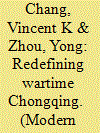

|
|
|
|
|
| Summary/Abstract |
This article examines the historical role and legacy of the foreign establishment in China's temporary capital Chongqing during the Chinese War of Resistance against Japan and the Second World War. This extraordinary episode, lasting from 1938 to 1946, ushered in a new era for China's foreign diplomacy and laid the foundation for its rise to world-power status. Placing Chongqing at the very heart of this epochal chapter in modern Chinese history, this article describes the major events, trends, and actors that directly or indirectly were instrumental to China's wartime transformation from a partitioned, de facto colony to a first-rate global power with a permanent seat among the ‘Big Five’. Seventy years after the end of the Second World War, this article presents fresh perspectives on a near-forgotten episode of China's war experience. Moving beyond the traditional typecasting of ‘Chungking’ as a primitive backwater in China's remote hinterland, this article reappraises wartime Chongqing as a major international centre at the spearhead of global change and as an important cradle of the modern power that China is today.
|
|
|
|
|
|
|
|
|
|
|
|
|
|
|
|
| 20 |
ID:
153558
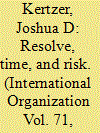

|
|
|
|
|
| Summary/Abstract |
Why do some actors in international politics display remarkable persistence in wartime, while others “cut and run” at the first sign of trouble? I offer a behavioral theory of resolve, suggesting that variation in time and risk preferences can help explain why some actors display more resolve than others. I test the theory experimentally in the context of public opinion about military interventions. The results not only help explain why certain types of costs of war loom larger for certain types of actors but also shed light on some of the behavioral revolution's contributions more broadly.
|
|
|
|
|
|
|
|
|
|
|
|
|
|
|
|
|
|
|
|
|